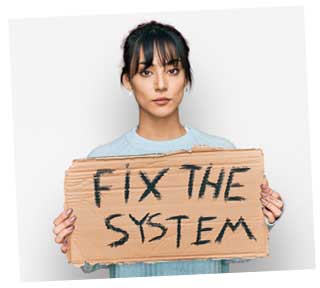Imagine Democracy without Professional Politicians
First
Reduce and Multiply Political Districts Almost Everywhere
The most important thing we can do to realize government of, by and for, the people, is to significantly reduce the size of electoral districts.
George Washington urged congressional districts of 30,000 inhabitants each, a proposal the Founders unanimously put into the Constitution.
But today, US House Districts average 760,000 persons each, and they are forever growing.
To win a political campaign in such large districts, candidates must typically raise millions of dollars, primarily from special interests, including interests that elected officials are supposed to regulate.
With truckloads of cash from these special interests, candidates then sell themselves to the voters they are supposed to represent. It’s a system that looks like institutionalized bribery, extortion and marketing more than it does representative democracy.
By reducing all electoral districts to 30,000 inhabitants or less (no more than 20,000 at the state level and no more than10,000 at the local level) we’d vastly reduce the role of money in politics because small districts can be won with yard signs, fliers and shoe leather.
Such community-sized districts are about reputations and relationships instead of money and marketing.
Normal citizens could win elected office without selling their souls to special interests or devoting their lives to politics.
Having many small districts would sometimes mean representatives legislating online from home, and living among their own constituents, the people they are supposed to represent, instead of among lobbyists and other politicians.
In the 21st Century people regularly work and learn from home. Is there any reason that our elected representatives couldn’t legislative from home?
Political districts on the scale of a neighborhood or a small community should be seen as the essential and foundational building blocks for an updated clean and democratic systems at all levels of American government.
Second
Decentralize Government
Decentralized power helps keep it in the hands of the people.
Decentralized democracy can be realized by reviving the 10th Amendment to the US Constitution, which is supposed to reserve most government power to the states. Let our states be democratic laboratories of public policy to the greatest extent possible.
Within states, devolve power to counties, cities and towns. Divide big cities into quasi-self-governing boroughs, or districts, like they do in some successful foreign cities.
Reimagine our political system as one that serves and empowers actual local communities and the diverse people who live in them.
Third
Make Most Elected Offices Part Time
Professional politicians don’t become experts at solving public policy challenges. They become experts at politics and reelection.
Members of the US House, the lower houses of US States, and most local elected officials, could serve part-time with minimal hourly compensation. In other words, they should keep their day jobs or serve in government during their retirements.
If elected officials no longer rely on their offices for their livelihoods, then they are more likely to be true public servants.
Fourth
Utilize Indirect Elections Where Appropriate
State and US Senators, or even mayors, governors and the US President, could be elected indirectly by the citizen representatives that would populate our new radically enlarged state legislatures and the US Congress.
Importantly, such indirect election would eliminate the need for political campaign fundraising for these upper houses and executive offices.
The Founding Fathers, in fact, originally designed the US Senate and the President to be picked via indirect election, by state legislatures and the Electoral College, respectively.
The relatively small US Senate, and state senates. could continue to meet full time and in person, as they do now, so that they might possess qualities possibly lacking in very large and sometimes remotely distributed lower houses.
While it may seem less democratic to remove the choice voters currently have of picking their own senators and chief executives directly, that loss of choice is balanced by involving far more everyday citizens in the democratic process through greatly expanded local councils, lower houses of state legislatures and a very large US House of Representatives, all comprised of normal citizens.
Such a tradeoff might be controversial, but is it a choice worth making in order to base the system on relationships and reputations rather than money and marketing?
Fifth
Enact Term Limits on the Most Powerful Positions
Senators and Chief Executives should be term limited, perhaps even to a single term, because we’ve learned that it’s not helpful if office holders are thinking about their next reelection when they should be thinking about the next generation.
On the other hand, part-time citizen legislators, representing small communities and neighborhoods, may not need to be term-limited. These citizen representatives will be giving more than they are getting, at least financially. They can safely accrue institutional knowledge without much risk of betraying the public trust. And if they do misbehave, their small districts will make them vulnerable to defeat at election time.
Sixth
Consider Citizen Juries/Deliberative Democracy
Juries are our most trusted democratic institution. In a jury trial, we rely on the judgement of a representative group of our fellow citizens to adjudicate all manner of crimes, including matters of life and death.
In various parts of the democratic world, citizen juries (often called “citizens’ assemblies”) are starting to make public policy.
The keys to a successful jury decision are that 1) the jury be a fair representation of the community at large and 2) the jury receives all the relevant information needed to fairly decide the matter at hand. These are not small challenges, and it will pay to approach deliberative democracy with caution.
Nevertheless, might deliberative democracy be employed immediately in cases where elected officials have inherent conflicts of interests?
Are elected officials really the best choices when it comes to the power of supervising their own elections, drawing their own electoral districts or establishing their own compensation?
Surely, in these cases, tasking a jury with power over such decisions would be the better option.
Seventh
Protect Government of the People with Direct Democracy
In the United States, direct democracy is often exercised through a “citizens’ initiative process.” It’s a necessary safety mechanism, like an emergency brake on an out-of-control vehicle.
The people themselves should always have a means to amend or rebuild their own political systems without the approval of elected officials. It’s the ultimate safeguard when representative democracy goes wrong.
Today, that ability of everyday people to successfully engage in a citizens’ initiative process is limited and often compromised. Though the process exists in most cities and certain states, signature requirements for citizen initiative petitions are usually so burdensome that reformers must hire paid signature gatherers. Here, again, is another example of money getting in the way of democracy.
Direct democracy to amend government charters and constitutions should always be available to the people without significant financial cost. If the casual change of government charters and constitutions is a concern, then let reasonable super majorities of public support be required based on votes, not mountains of money.
Realistic Strategy
The Path Forward
Though the precise reform applications are debatable, our mission is clear. We must fundamentally transform our political system from one that primarily serves the professional political class and other special interests to one that serves the broad and long-term needs of the American people.
It will not be easy, but the task is as necessary as it is difficult.
Our path forward begins locally, where we can prove the above concepts at relatively little cost. See our non-profit educational organization, Cities Rising, created to teach city and county reformers best democratic practices.
After success reforming cities and counties, we can begin to focus on state governments as we work our way up to the federal level.
Citizens Rising is a one-of-kind organization aspiring to become a movement. We are not backed by big money, unlike the system we plan to disrupt and reform. If you share our nonpartisan transformative democratic vision, then please join us with a financial donation and sign up to get on our mailing list.
Truly, we can’t do this without you.
Join us, to restore government of, by and for, the people.
Join Us
About
Cities Rising!
Cities Rising is a new nonprofit charitable organization dedicated to public education and conversation about the best democratic practices for municipal government in the United States and beyond.
Did you know that some of the world’s most livable cities are governed by city legislatures consisting of many everyday people?
Did you know, too, that some of these same cities practice decentralized democracy, with representative government functioning near the people, at the borough level?
Parents Rising!
American schools are underperforming. School closures during the covid crisis set students back, and now they struggle to catch up. Meanwhile, political and social ideology is dividing school communities and distracting from the essential mission of educating students. School boards have become politicized, which is a natural outcome of educational systems run by politicians beholden to various interests. It’s time to consider new ideas for school system governance based firmly on parent control. It starts with small, community-sized, school board districts. Learn more at ParentsRising.net.








